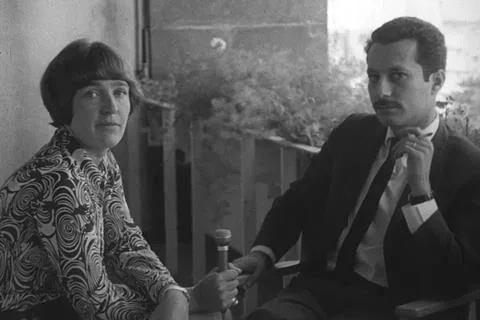Dir/scr: Göran Hugo Olsson. Sweden/Finland/Denmark. 2024. 206 mins Göran Hugo Olsson could hardly have anticipated how timely his latest archive
Dir/scr: Göran Hugo Olsson. Sweden/Finland/Denmark. 2024. 206 mins
Göran Hugo Olsson could hardly have anticipated how timely his latest archive-based documentary would turn out to be at the start of the five-year production process. Having explored the US civil rights movement with The Black Power Mixtape (2011), and colonialism in Concerning Violence (2014), Olsson now digs into the conflict between Israel and Palestine in this illuminating, even-handed magnum opus. Footage captured by reporters from Swedish public service broadcaster STV in the second half of the 20th century again provides him with a jumping-off point.
Exhaustive in its detail and balanced in its spread of voices
As the title indicates, the material is sourced from between 1958 and 1989 and thus it’s most useful as background context on the current crisis rather than a commentary on present-day hostilities. But if we take one thing from the picture, it’s that history in this region is still unfolding, and that it moves in a cycling spiral rather than a straight line.
As a primer to the backdrop of the exceptionally bleak current situation, the film is invaluable. However since the mammoth running time – the film clocks in at nearly three and a half hours – will likely prove to be a stumbling block to a cinematic release, the picture’s post-festival life is most likely to play out on television or streaming platforms. The film screens at the Tokyo International Film Festival following its premiere at Venice and a slot in the London Film Festival, among others.
Drawn from the archives of the Swedish public broadcaster SVT, the material is exhaustive in its detail and balanced in its spread of voices. The film combines footage of geopolitical big-hitters – there are clips of David Ben-Gurion, Golda Meir, Muhammad Anwar and Yasser Arafat – with intimate interviews with ordinary folks from both sides of the divide that seems to get more polarised as time passes.
Olsson’s approach here is refreshingly restrained: rather than carving up the material into a rapid-fire montage onslaught, he respects the integrity and artistry of each piece of reportage. Excerpts are presented in chronological order and are carefully attributed, with the programme, the date and the producer or reporter credited. The material is culled from current affairs programs and news reports, as well as children’s television accounts of life for the younger generation in the region.
Balancing the harrowing clips of war, there’s footage of a woman who dedicated her life to studying the musical traditions of the various Jewish communities that have come together in the State of Israel, alongside interviews with the displaced Palestinian family whose ancestral land became the location of the hobby farm of prime minister-to-be Ariel Sharon as well as thoughtful quotes from Israeli writer and left-wing intellectual Amos Oz.
Archive material, we are told at the film’s opening, doesn’t necessarily tell us what happened, but it says a lot about how it was told. It’s a useful caveat to keep in mind. Even with its mandate for neutrality and scrupulous journalistic distance, it seems as though the SVT coverage skews slightly towards the stories of violence and anger. It’s not surprising: a terrorist atrocity or an example of Israeli military brutality makes headlines; a call for de-escalation or a diplomatic solution from a moderate politician or intellectual doesn’t have quite the same newsworthy immediacy. The picture indirectly poses the question of whether global media coverage that focuses on conflict rather than the push towards a solution might ultimately be part of the problem.
The film is an endurance test that earns its running time with the exceptionally high quality of the reporting and the sober eye that it casts over the region. A particularly grim takeaway is the way that the media – and by extension we as consumers – have become inured to the horrors unfolding. In the 1970s, a single death on either side would have been considered newsworthy. Times have most definitely changed.
Production company: Story
International sales: Reservoir Docs [email protected]
Producer: Tobias Janson
Editing: Britta Norell
Music: Gary Nilsson

COMMENTS